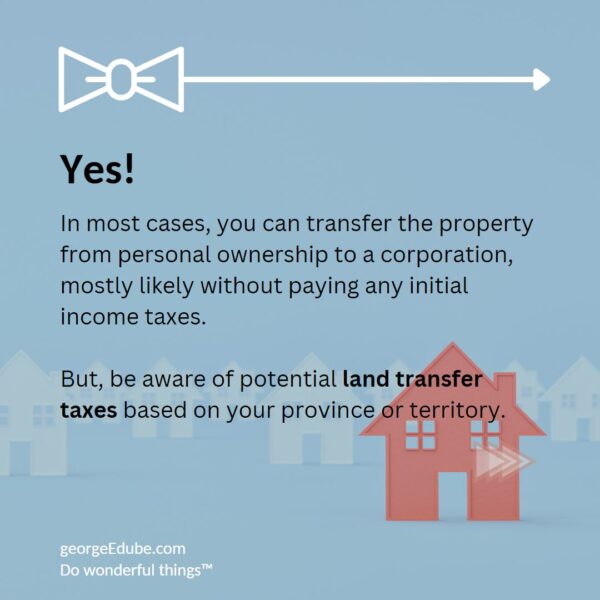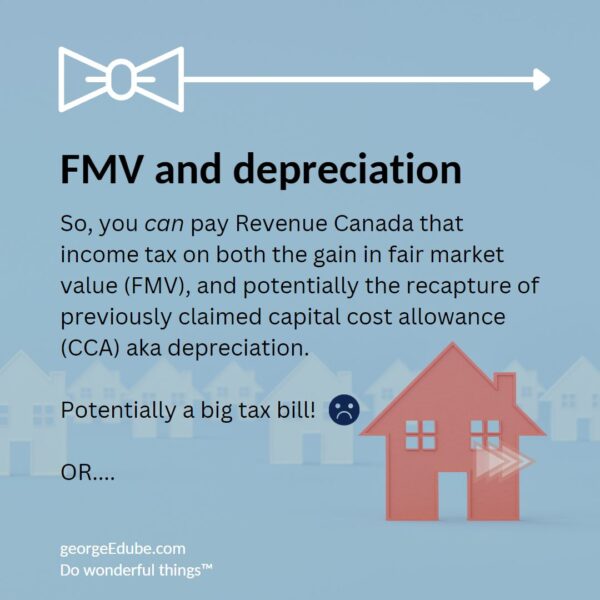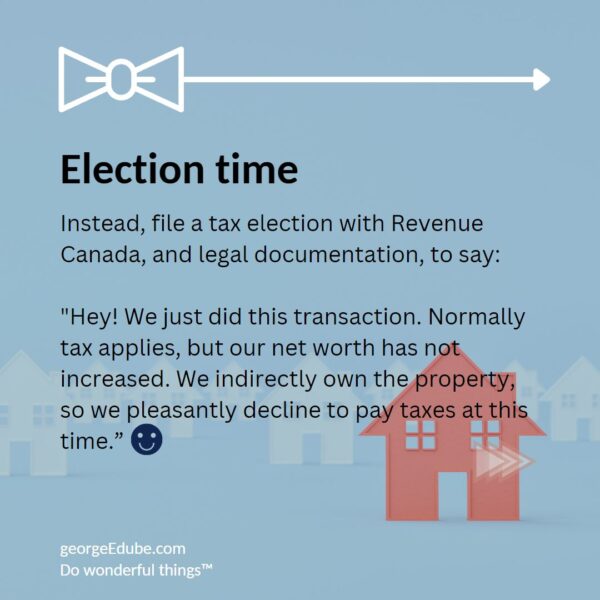If you have real estate investment properties in your personal name, moving investment properties to a corporation is a common tactic. We help real estate investors move personally owned investment properties to their corporations regularly. But you must avoid traps in this process to prevent a major tax impact. The Canada Revenue Agency takes a keen interest in ensuring that real estate investors who are moving investment properties from personal ownership to corporate ownership do this correctly. This is not a DIY project. Having your power team onside – your real estate accountant and lawyer, and your financing expert – is critical.
Transcript: Moving investment properties to a corporation
Our video transcript is below:
I own some personal property, investment property, I want to set up a corporation. How can I fix this?

I’m George Dube, saving the world from tax, one bowtie at a time™.
This is a common series of questions or thoughts that we’ll receive. And again, work-on on a very regular basis.

So, in the majority of cases, we are going to be able to transfer that property from personal ownership to a corporation, most likely without incurring any initial income taxes. Depending on the province or territory we’re dealing with, we probably have some land transfer taxes.

But we certainly have Revenue Canada very interested in the transaction. Absent anything else, we’re going to be deemed to have sold for fair market value, the property to the corporation. And hopefully, your properties have increased in value over time.

So, you have the choice of either paying Revenue Canada that income tax, which is not only on the gain of the property itself, but remember, you may also have recapture of previously claimed capital cost allowance, or more commonly known as depreciation. So, that tax bill can be significant.

There is an ability to file a tax election with Revenue Canada, and provided it is completed at the same time with legal documentation from that legal team, we essentially can show Revenue Canada that,
“Hey, here we are. We’ve just done this transaction, which normally tax applies to, but our net worth has not increased, we’re indirectly owning the property, so we pleasantly decline to pay taxes at this time. Please keep us on your Christmas card list.”
And again, Revenue Canada provided the right steps have been processed, will be perfectly fine with that, and assuming the property qualifies.

So now, it’s the opportunity, requirement to talk to your tax advisor to see whether that’s possible. And again, in the vast majority of cases, it will be possible. But there are a couple tricks in there, or traps that you want to ensure you don’t accidentally fall into.
Thanks for watching. And again, this is summary in nature. There’s a lot more to it that will also be dependent on your particular situation.
Have more questions, please subscribe, follow, and even share. I want all of us to have the tax information we need to do wonderful things™.
-End transcript-
Resources
For additional resources related to moving investment properties to a corporation, and to incorporating a business, please see:
- When and How Should You Incorporate a Real Estate Business
- Tax Bulletin: Incorporating Your Business
Back to: Buying real estate in a corporation: Ultimate guide for Canadian real estate investors
More questions?
Still have questions? I want to help you Do Wonderful Things™ with your real estate investments, so please contact me today.
Remember – circumstances are unique! This information is summary in nature. Seek out advice from your tax advisor about your specific situation.


